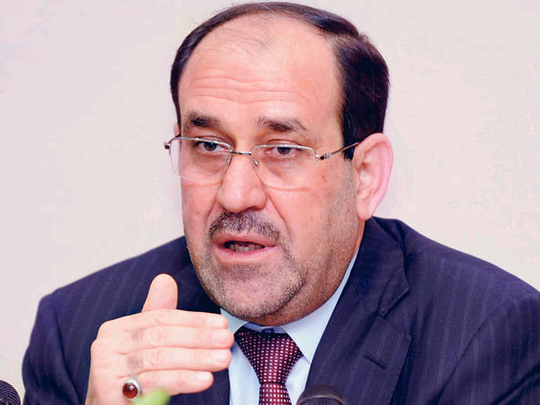
The current Iraqi political scene reveals a dangerous fact which has been overlooked by political analysts. Since the elections, which took place seven months ago, it is evident that Iraq lacks the immunity against any crisis, and the inability to face it. This is an indicator of the country's new fragile national security.
Any crisis on the national level that cannot be resolved will no doubt paralyse the country's abilities on all levels and leave it exposed to foreign interferences. Such a situation will also compromise the sovereignty of the nation.
The remoteness of the political elite from the grim reality of the Iraqi people is also evident. The meetings and gatherings where members of political blocs carry out their boring and futile discussions have become completely isolated from the people.
However, the secluded Green Zone as well as the politicised media have also succeeded in marketing political figures as merchandise to win the race for prime ministership.
This isolation has also succeeded in absorbing the anger of a people with no real leadership that can transform their legitimate fury into political action.
Hundreds of thousands of articles in countless newspapers and websites have been written about the gridlock facing the formation of a new government in Iraq. Thousands of seminars and gatherings took place where experts discussed the political stalemate.
Irrespective of the discussions in those meetings, the crisis has continued, and there is nothing that will prevent it from going on.
The collapse of the Iraqi National Coalition was the most outstanding occurrence of late. The Sadrists, with their 40 seats, backed the State of Law Coalition with its 89 seats; only to be joined by the head of the Badr Organisation, the National Reform Movement (1 seat), and the Iraqi National Congress (1 seat).
However, the State of Law Coalition will not be able to form a government unless it has 163 seats.
The Islamic Supreme Council for Iraq (ISCI), Al Fadila party and the Badr Brigade, all of whom are a part of the INC, have all become closer to Al Iraqiya List.
Another sensational happening took place when the Al Iraqiya List said it was willing to support the candidature of ISCI's Adel Abdul Mehdi.
This move may well give way to the formation of an alliance, including Al Iraqiya, the ISCI, Al Fadila party and other smaller blocs, to weaken the position of outgoing Prime Minister Nouri Al Maliki's chance for a second term as premier. Nevertheless, even this alliance will not be able to gain a majority in the parliament to form a government.
Amidst this political stalemate, the Iraq Al Wasat Alliance was born after the merger of Iraqi Unity Coalition and the Iraqi Accordance Bloc. Iraq's political scene may further witness additional splits or mergers as the political process continues to mature.
It may be noted that there is a limited number of members of the parliament in the scene today, while most of the 325 law makers are neither seen nor heard
Possibility of a split
There are also disagreements in the Kurdish alliance between the two major parties and the Kurdish opposition party, Gorran, over the Kurdish Region's election law and the talks for renewing the term of President Jalal Talabani. Observers do not exclude the possibility of a split within the Kurdish Alliance led by Gorran.
The Iraqi political scene has produced two candidates for the post of prime minister. However, neither will be able to obtain the majority to form a government.
Moreover, the winner will have to do a balancing act as he will have to accommodate diverse political allies.
In all this, the Kurdish Alliance's role has once again surfaced as the balancing bloc. Currently the Kurds have the ability to make or break the political stalemate by backing one party against the other.
Thus, the Kurds started their bilateral talks with the State of Law Coalition and Al Iraqiya List, separately and simultaneously to find out who of the two will give in more concessions and agree to the 19 points set in the Kurdish negotiating paper.
The Kurdish's relations with the ISCI over the past years were better than its relations with the Al Dawa party.
Despite the fact that its liberal ideas are closer to Al Iraqiya list, the Kurds are drawn closer to choosing Al Maliki because both Iran and the US are backing him for a second term. Therefore, negotiations with Al Iraqiya list are a mere pressure tactic exerted on the State of the Law Coalition for more Kurdish benefits.
Washington has not welcomed the Sadrists' endorsement of Al Maliki, as the US is keen on removing the Sadrists from all the government positions, especially those related to the security.
Some believe the Sadrists' backing of Al Maliki has weakened his political position with the US.
The next few days may prove to be crucial. Securing the support of the Kurds may prove to be too dear a price to endure by the State of Law Coalition and Al Iraqiya list alike.
Mohammad Akef Jamal is an Iraqi writer based in Dubai.










